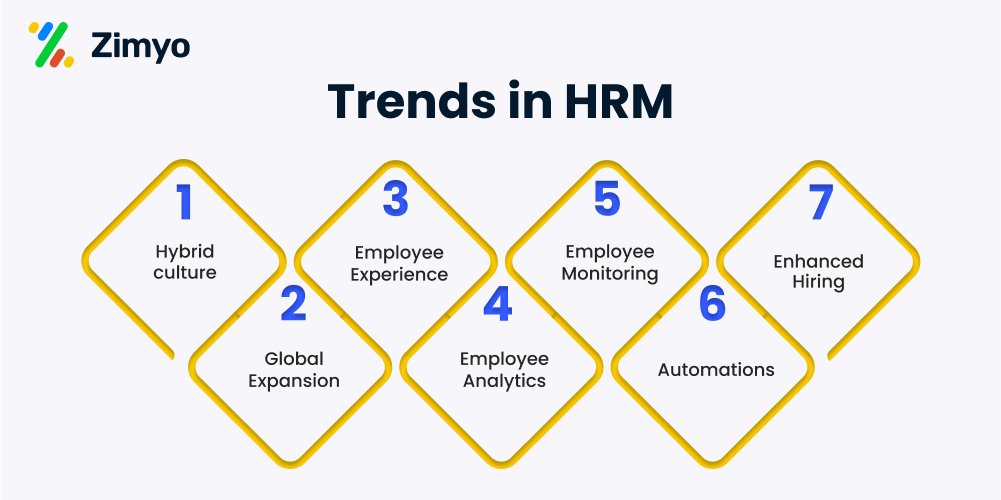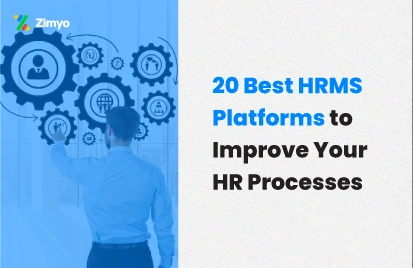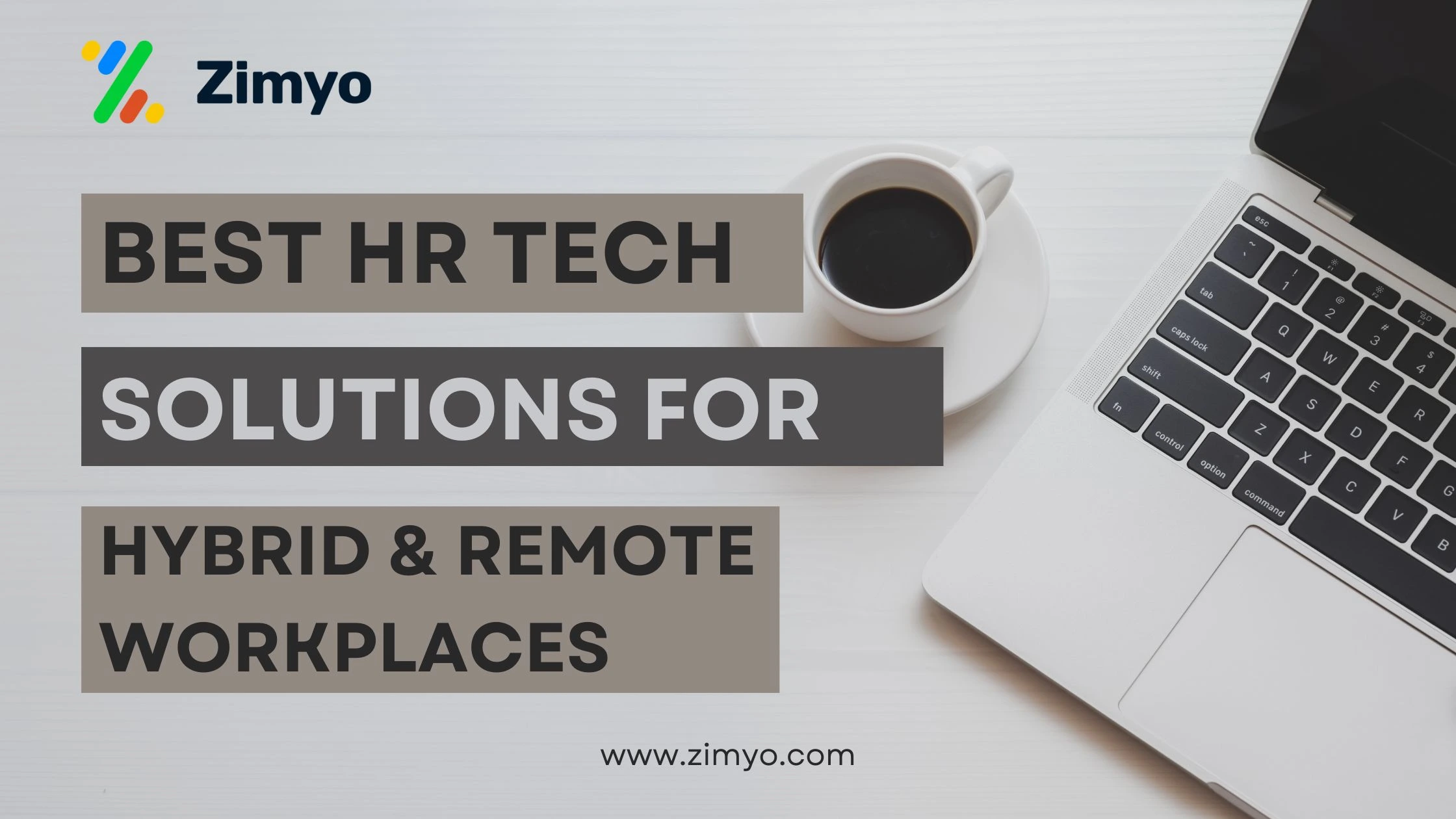How is Human Resource Management Changing?
The role of Human Resource Management (HRM) is evolving rapidly to meet the dynamic needs of the modern workplace. With technological advancements, shifting workforce expectations, and an increased focus on employee well-being, HR leaders must stay ahead of the curve. Understanding the HR trends of today can help organizations build a more agile, productive, and engaged workforce. Companies that fail to adapt to these changes risk falling behind in attracting and retaining top talent.
From our perspective, here are the list of recent HR trends for 2025 and beyond:
- AI and Automation in HR
- Remote and Hybrid Work Models
- Employee Experience and Well-being
- Upskilling and Reskilling
- Data-Driven HR Decision-Making
- DEI (Diversity, Equity, and Inclusion) Initiatives
- Focus on Employee Retention
- HR Tech and Cloud-Based Solutions
Recent HR Trends in 2025

1. AI and Automation in HR
One of the most significant current trends in HRM is the integration of artificial intelligence (AI) and automation. AI-powered recruitment tools help streamline hiring by screening resumes, scheduling interviews, and even assessing candidate suitability. Additionally, chatbots and AI-driven HR systems are enhancing employee engagement by providing instant support for queries regarding payroll, benefits, and leave management. Automation is not only improving efficiency but also reducing administrative burdens, allowing HR professionals to focus on strategic initiatives.
2. Remote and Hybrid Work Models
The pandemic accelerated the shift toward flexible work arrangements, and recent trends in human resource management indicate that hybrid work is here to stay. Organizations are now investing in digital collaboration tools, redefining workplace policies, and implementing performance management systems designed for remote teams. Employers are also experimenting with flexible work schedules to improve productivity and work-life balance. As companies embrace hybrid models, fostering a sense of inclusion and engagement among remote employees remains a top priority.
3. Employee Experience and Well-being
A strong focus on employee well-being has become one of the latest trends in human resource management. Companies are recognizing that employee satisfaction directly impacts productivity and retention. Mental health initiatives, stress management programs, wellness benefits, and access to counseling services are becoming integral parts of HR strategies. Additionally, companies are fostering a positive work culture by emphasizing recognition programs, flexible benefits, and policies that support work-life integration.
4. Upskilling and Reskilling
With the rapid advancement of technology, current trends in HR management emphasize continuous learning. Businesses are investing in upskilling and reskilling programs to help employees stay relevant in an evolving job market. Learning management systems (LMS), microlearning modules, and AI-driven personalized learning paths are gaining traction. Employees who regularly update their skills feel more engaged and are better equipped to adapt to changing job roles, making this an essential trend for long-term business growth.
5. Data-Driven HR Decision-Making
HR analytics is transforming how organizations manage talent. By leveraging data, companies can gain insights into employee performance, attrition rates, engagement levels, and workforce planning. Predictive analytics enables HR teams to make proactive decisions, such as identifying employees at risk of leaving and implementing retention strategies. Utilizing data-driven approaches ensures HR policies are not just intuitive but backed by measurable outcomes, making it a crucial aspect of the latest trends in HR management.
6. DEI (Diversity, Equity, and Inclusion) Initiatives
A strong emphasis on workplace diversity and inclusion remains one of the current trends of human resource management. Companies are prioritizing hiring diverse talent, implementing bias-free recruitment strategies, and fostering inclusive workplace cultures. Training programs on unconscious bias, equal opportunity policies, and leadership accountability for DEI efforts are becoming standard. As companies work toward equitable work environments, they enhance innovation, employee satisfaction, and overall business success.









7. Focus on Employee Retention
The war for talent continues, making employee retention a top priority. Recent trends in HRM suggest that organizations are shifting from reactive retention strategies to proactive employee engagement initiatives. Personalized career development plans, mentorship programs, competitive compensation packages, and strong employer branding are key strategies to reduce turnover. Additionally, fostering a culture of trust, recognition, and career growth opportunities can significantly impact employee loyalty and satisfaction.
8. HR Tech and Cloud-Based Solutions
The adoption of cloud-based HR management systems is growing. These tools streamline HR functions such as payroll, performance tracking, compliance management, and employee engagement. As HR software solutions become more sophisticated, businesses can leverage AI-driven analytics, automation, and integration capabilities to enhance HR processes. This technological transformation is not just a convenience but a necessity, making it a fundamental part of the latest trends in HRM.
Why Staying Updated with HR Trends is Essential

As the workplace continues to transform, staying informed about recent trends in HRM can help organizations remain competitive. Adapting to these changes enhances workforce efficiency, improves employee satisfaction, and ensures business success in the long run. Companies that embrace these trends will be better equipped to attract top talent, retain valuable employees, and build a resilient workforce capable of navigating the challenges of the future.
The Crux
The latest trends in HR management highlight the importance of technology, flexibility, employee well-being, and data-driven decision-making. Organizations that embrace these trends will create a more resilient, engaged, and future-ready workforce. Staying ahead of these changes is not just beneficial—it’s essential for sustained growth.
HR leaders must proactively adapt to these shifts by integrating AI, prioritizing employee well-being, and leveraging data analytics for better decision-making. By doing so, they will not only enhance organizational efficiency but also foster a work environment where employees feel valued and empowered.
The new trends in HRM certainly transformed the traditional methods and made high-quality employee experience the center of attention. To be ahead in the HR game, rely more on data than your intuition with Zimyo HR and Payroll software with additional benefits for all your employees.
I was able to implement the platform on my own. It helps in assigning the tasks to other employees, conducting surveys and polls, and much more. The ease of use and self-onboarding is something that I would like to appreciate.
Sonali, Kommunicate
Zimyo simplifies attendance management for our organization. The leave and attendance are so streamlined that we have never faced any difficulties with the system.
Anurag, Eggoz Nutrition
FAQs (Frequently Asked Questions)
Employee management, time & attendance management, employee self service portals, leave management are some of the emerging trends in HRM.
These include technological advancements, remote work, diversity and inclusion, employee well-being, data-driven decision-making, skills development, and agile HR practices.







